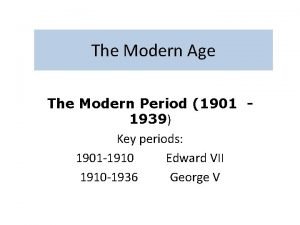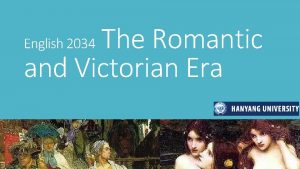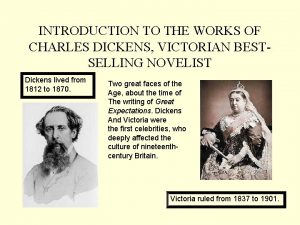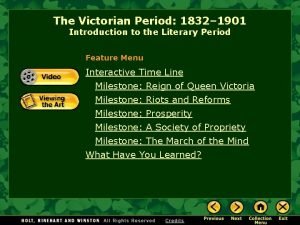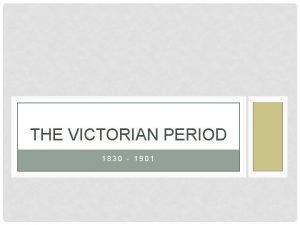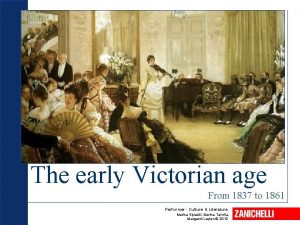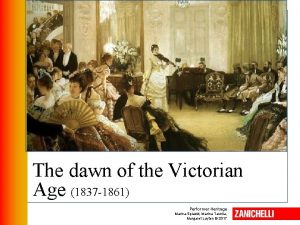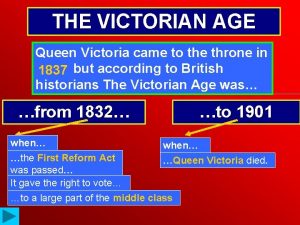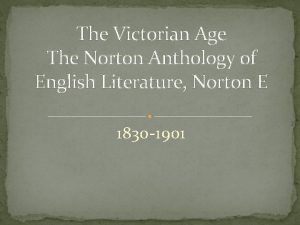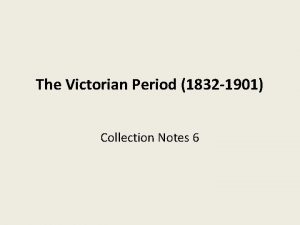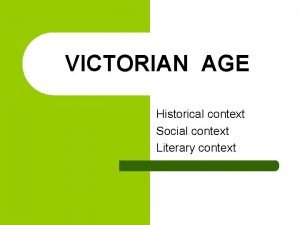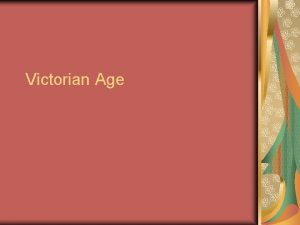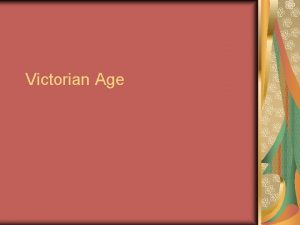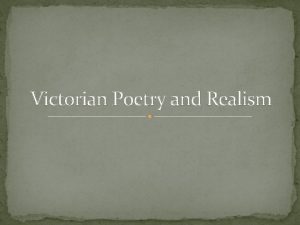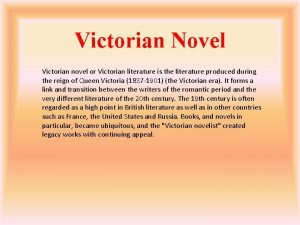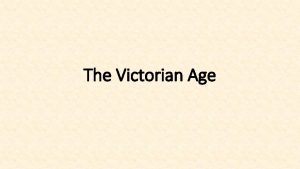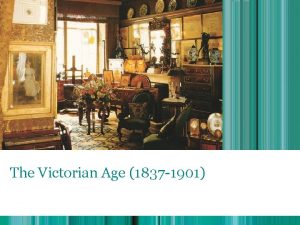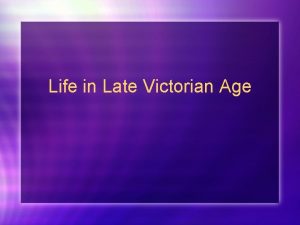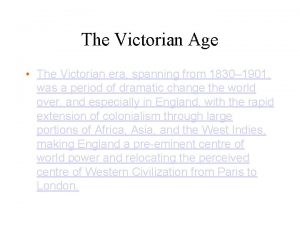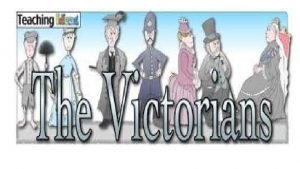The Victorian Age o the age of the



















- Slides: 19

The Victorian Age o the age of the empire 1837 -1901

Historical context • 1837 ascent to the throne of Victoria • her young age (18) and lack of experience facilitates the establishment of a constitutional monarchy with the government controlled by Parliament • the process of industrialization started in the late 18 th century goes on without meeting any obstacles.

first decades of Victoria’s reign • • • terrible working conditions in the factories; high food prices; economic depression; much discontent among the workers first working class movements.

Chartism • Chartism was perhaps the first mass working class movement in the world. • It was made up of radicals and workers who presented a document, “the People’s Charter”, to Parliament in 1838. • It aimed at political and social reforms in the United Kingdom and was active between 1838 and 1848.

“the People’s Charter” • Universal suffrage for all men over the age of 21; • Equal-sized electoral districts; • Voting by secret ballot; • An end to the need for a property qualification for Parliament; • Pay for members of Parliament; • Annual election of Parliament;

• When the petition was refused by Parliament, many advocated the widespread use of force as the only means of attaining their aims; • Several outbreaks of violence ensued, leading to several arrests and trials.

• In 1842, workers went on strike in the Midlands, Lancashire, Yorkshire, and parts of Scotland in favour of Chartist principles; • Mounted cavalry and armed troops were employed to deal with the strikers; • Several Chartist leaders were arrested along with nearly 1, 500 others. • 79 people were sentenced, with sentences ranging from 7 to 21 years, transportation to Australia and even death.

• The movement disappeared towards the middle of the century without achieving its objectives; • workers and labourers had to wait until: • 1867 (2 nd Reform Bill) to obtain the right to vote. • 1871(Trade Union Act) they saw their Trade Unions legalised.

Other important historical events 1. the 1845 Famine in Ireland; caused by a failure of the potato crop on which the poor depended for their survival. It brought about thousands of deaths for starvation and a mass migration to the USA. 2. the 1846 Abolition of the Corn Laws; a. the Tory Party broke up and lost power in Parliament which passed to the Whigs (the Liberals); b. there was a reduction of the bread price;

Other important historical events 3. Introduction of new farming techniques (improvement of the agricultural production and prosperity for farmers); NB: the reduction in the price of bread and the growth in the agricultural production – had a positive effect on the living conditions of the lower classes, as well. 4. Political troubles in Ireland • • Catholics in Ireland did not have the same civil and political rights as the Irish Protestants. Since the beginning of the XIX century the Irish Catholics had been asking for reforms and equal civil rights.

Origins of the conflict between Catholics and Protestants in Ireland • Saint Patrick (born ? – died AD 461 or AD 493) and other Christian missionaries arrived in Ireland in the 5 th century. • By the year 600 Ireland had become Christian. • The coming of Anglo-Norman mercenaries in 1169 marked the beginning of more than 800 years of direct English involvement in Ireland. • The English crown did not begin asserting full control of the island until after the English Reformation, when a series of military campaigns was launched between 1534 and 1691. • This period was also marked by an official English policy of plantation which led to the arrival of thousands of English and Scottish Protestant settlers. From this period on, sectarian conflict became a recurrent theme in Irish history.

Political troubles in Ireland • The Catholics’ peaceful requests were not satisfied by the English Parliament; • Much discontent among the Catholics • Riots, violent protests and eventually terrorist attacks. • The Liberals with Gladstone tried to solve the Irish question in 1886 and 1893 proposing Bills in Parliament in favour of Ireland’s Home Rule. • the Parliament rejected the bills.

Political troubles in Ireland • • This gave rise to the “Sinn Fein” (“ Ourselves Alone”) , an extreme nationalistic movement that demanded and fought for an independent republic. “Sinn Fein” still exists nowadays and struggles for the unification of the two Irelands.

the second half of the XIX century a number of reforms were introduced : the Mines Act of 1862 the 2 nd reform bill of 1867 the Elementary Education Act of 1870 the Trade Union Act of 1871 the Public Health Act of 1875 the 3 rd Reform bill of 1884 all these reforms were made while the Liberals were in power • positive influence of the political philosopher John Stuart Mill (1806 – 1873) on the Liberals • •

John Stuart Mill • J. S. Mill had accepted the basic principles of Utilitarianism formulated by Jeremy Bentham but with a few corrections. • Mill’s famous formulation of Utilitarianism is known as the "greatest happiness principle”. • It holds that one must always act so as to produce the greatest happiness for the greatest number of people, but….

• Mills recognized that if the individual was left completely alone in the pursuit of happiness, the weak and the powerless would inevitably be exploited and oppressed by the powerful, therefore… • some rules had to be made in order to regulate the laissez-faire economic policy, (through which the utilitarian principles were put into practice) and limit its negative consequences on the population.

The last three decades of the XIX century • • Economic situation economic depression social tensions the economic depression was mainly due to … the increased competition from other industrial countries, in particular Germany and USA. tariff barriers to protect their domestic industries. English economy strongly depended on foreign export so … it was deeply affected by these protectionist policies.

The last three decades of the XIX century Political situation • England had become a more democratic country. • In 1884 and in 1888 two more Reform bills had extended the right to vote to the to agricultural workers and miners. • transformation of the electoral basis of the House of commons – the real centre of the legislative power.

Utilitarianism • Ethical doctrine according to which the moral worth of an action is determined by its outcome — i. e. the ends justify the means. • Utility — the good to be maximized — has been defined by various thinkers as happiness or pleasure (versus suffering or pain). • the origins of Utilitarianism, as a specific school of thought, are generally credited to the philosopher and social reformer Jeremy Bentham (1748 – 1832). • Bentham found pain and pleasure to be the only essential values in the world: "nature has placed mankind under the governance of two sovereign masters, pain and pleasure. " • From this he derived the rule of utility, that the good is whatever brings the greatest happiness to the greatest number of people.
 Victorian age and modern age
Victorian age and modern age Victorian period in english literature
Victorian period in english literature Geometric mass floral design
Geometric mass floral design Ancient roman floral design
Ancient roman floral design Stone age chronology
Stone age chronology Iron age bronze age stone age timeline
Iron age bronze age stone age timeline Performer heritage 2 pdf
Performer heritage 2 pdf The main characteristics of the victorian age
The main characteristics of the victorian age Victorian period
Victorian period Characteristics of victorian novels
Characteristics of victorian novels Victorian era notes
Victorian era notes Charles dickens jobs
Charles dickens jobs Victorian age introduction
Victorian age introduction Domestic propriety
Domestic propriety The victorian compromise zanichelli
The victorian compromise zanichelli The dawn of victorian age
The dawn of victorian age Respectability victorian age
Respectability victorian age Norton anthology victorian age
Norton anthology victorian age Victorian age 1832 to 1901
Victorian age 1832 to 1901 What is literary context
What is literary context
